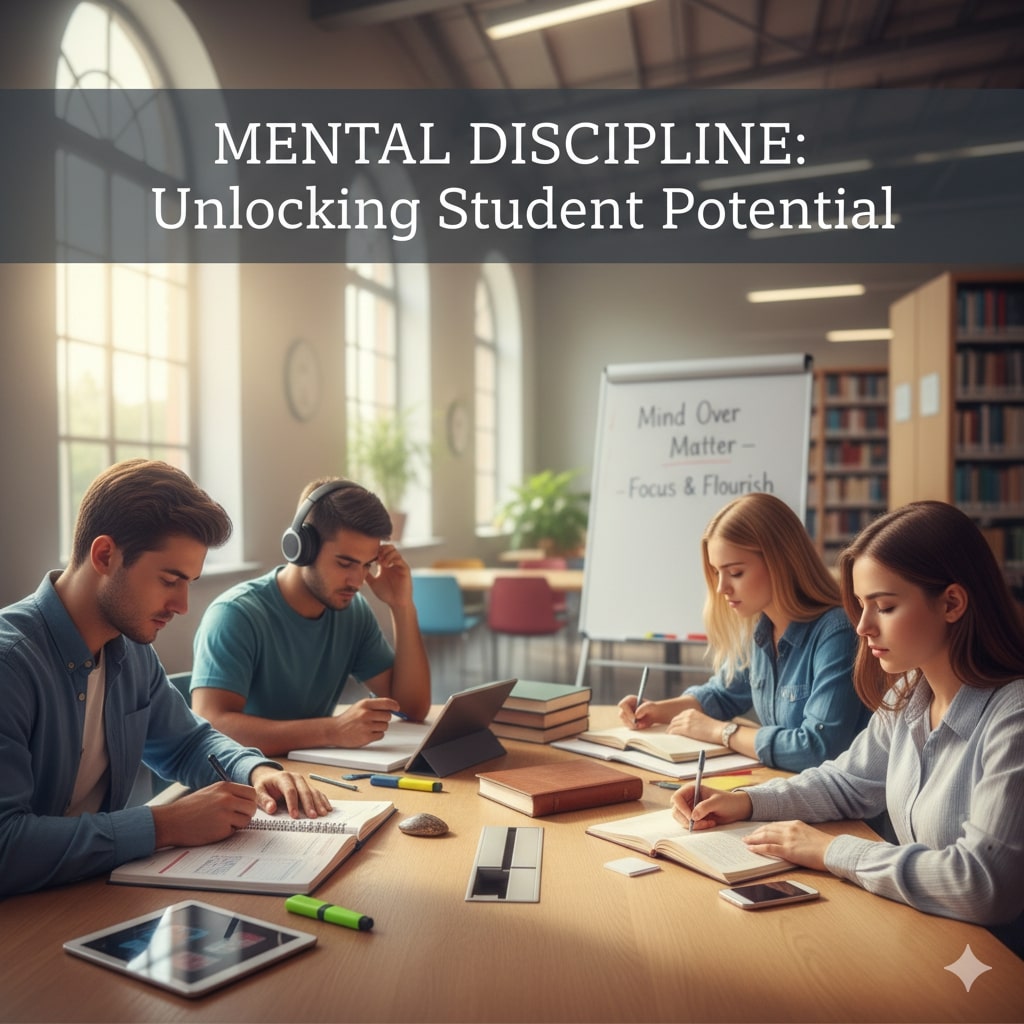The Mental Discipline Built Through SAT Prep
Imagine sitting down to study and finding your attention drifting after ten minutes. Now imagine a few months later: you sit down, map out a plan, and two hours glide by because you’re locked in—reading with purpose, solving problems efficiently, and checking your work with calm precision. That transformation doesn’t happen by accident. For many students, preparing for the Digital SAT is less about a single score and more about the mental discipline developed along the way. This discipline shows up as improved concentration, sharper reasoning, and better stress management—skills that extend far beyond test day.
Why SAT Prep Is Training for the Mind
At first glance the SAT looks like a content test: algebra, reading comprehension, grammar. But underneath those questions is a bigger exercise—an exercise in sustained attention, pattern recognition, strategic decision-making, and time allocation. Think of SAT prep as a gym for executive function. You strengthen working memory when you hold multiple steps of a math problem in mind. You sharpen cognitive flexibility when you switch between reading passages and problem-solving. You hone metacognition when you reflect on why you missed a question and choose a different strategy next time.
Real-World Payoff: How Skills Transfer
These mental muscles are portable. Teachers notice students who trained for the SAT often participate more in class, juggle longer homework sessions, and write clearer essays. Employers and colleges appreciate applicants who demonstrate consistent study habits and resilience. The routines you build—breaking complex projects into manageable parts, scheduling regular focused sessions, and reviewing performance objectively—are the same practices adults use to succeed at university and work.
Core Components of Mental Discipline You Build During SAT Prep
Let’s break the discipline into concrete pieces so you can see what you’re actually training:
- Focus & sustained attention: Working through full practice sections, resisting distraction, and learning to recover after a lapse.
- Time management: Allocating minutes per question, knowing when to move on, and simulating test timing so it feels familiar.
- Analytical reasoning: Spotting patterns in questions, recognizing trap answers, and reducing errors through better logic.
- Strategic decision-making: Choosing which questions to answer first and when educated guessing is the best move.
- Emotional regulation: Managing test anxiety, staying composed during a tough section, and bouncing back from mistakes.
- Metacognition: Learning how you learn—tracking mistakes, identifying weak patterns, and adjusting study plans.
A Pleasant Surprise: The Digital SAT’s Role in Building Discipline
The Digital SAT has reshaped how students practice: adaptive sections, built-in calculators for math sections, and digital tools inside the testing environment. Practicing in the same digital context—with Bluebook and official digital practice tests—does more than build familiarity with the interface. It trains students to focus on screen-based reading, keep track of notes digitally, and manage time while navigating adaptive question sets. These are modern skills that map directly to online exams, college coursework, and digital workflows in professional life.

How to Build Mental Discipline Through a Smart SAT Prep Plan
Discipline isn’t about punishing yourself with endless hours. It’s about building systems that make focused work inevitable and recovery natural. Here’s a practical plan you can adapt whether you have eight weeks or eight months before your test.
1. Start with a Baseline
Take a full digital practice test early—preferably in a single sitting using the official Bluebook app or an official practice form. This gives you a realistic sense of your starting point, how the digital format feels, and which sections need the most attention. After your baseline test, spend time analyzing not only what you missed, but why you missed it: careless error, time pressure, conceptual gap, or misunderstanding the question.
2. Create Micro-Goals
Break big goals into weekly and daily micro-goals. Instead of “improve reading,” try “practice two passage-question sets focusing on inference questions and review vocabulary in context.” Small, measurable goals lead to steady momentum and clear feedback—both essential for building discipline.
3. Use Focused Study Blocks
Work in 45–90 minute focused blocks with 10–15 minute breaks—adjust based on what fits your attention span. During these blocks, remove distractions: put your phone in another room, use a distraction-blocker if needed, and keep water and a small snack nearby. The more you protect these blocks, the more you teach your brain to enter a state of purposeful focus.
4. Embrace Distributed Practice
Spacing practice—working on the same skill across multiple days—beats cramming. Distributed practice strengthens retention and supports deep learning. Use a study calendar and rotate reading, math, and practice tests so you’re constantly reinforcing different skill sets.
5. Reflect and Adjust Weekly
At the end of each week, review your practice logs. Which question types still trip you up? Did timing get better? What emotional patterns emerged on full practice tests? Adjust the next week’s micro-goals accordingly. This cycle of practice, reflection, and adjustment is the engine of mental discipline.
Where Personalized Support Fits In
Sometimes you’ll know what to practice but not how to fix it. That’s where personalized tutoring can fit naturally into your plan. One-on-one guidance helps you identify blind spots faster, anchor practice with targeted strategies, and keep your plan aligned to the score you want. For students who want that tailored approach, Sparkl’s personalized tutoring offers expert tutors, tailored study plans, and AI-driven insights that help translate practice mistakes into growth. When used sparingly and strategically, tutoring accelerates the discipline-building process rather than replacing it.
Daily Routines That Reinforce Discipline
Discipline thrives on routine. Here are daily habits that turn good intentions into progress.
- Morning review (15 minutes): Skim flashcards or review the previous day’s mistakes. This primes your memory and reduces the cognitive load for later study.
- One focused practice block (45–90 minutes): Tackle a section or two with undistracted attention. Use official digital practice when possible to stay familiar with the testing environment.
- Short mixed practice (20–30 minutes): Rotate math problems, grammar questions, and one reading passage to keep skills fresh.
- Reflection (10–15 minutes): Journal what worked, what didn’t, and one specific plan for tomorrow. Tracking your process builds metacognition.
- Rest and recharge: Build in exercise, social time, and sleep. Mental discipline collapses without recovery—never trade sleep for a few extra practice questions.
Example Weekly Schedule
| Day | Main Focus | Practice Type | Time |
|---|---|---|---|
| Monday | Algebra foundations | Targeted problem sets + review | 60–90 min |
| Tuesday | Reading comprehension | 2 passages, deep annotation practice | 45–60 min |
| Wednesday | Grammar & writing | Editing practice + timed drills | 45–60 min |
| Thursday | Mixed practice | Short blocks across sections | 60 min |
| Friday | Full section timing | One full section under timed conditions | 30–60 min |
| Saturday | Practice test or longer rehearsal | Half or full digital practice test | 2–3 hours |
| Sunday | Review & rest | Score review + light practice | 30–60 min |
Techniques That Strengthen the Mind
Beyond structure, specific techniques accelerate the growth of mental discipline. These are practical, evidence-based approaches you can apply immediately.
SQ3R for Reading
SQ3R—Survey, Question, Read, Recite, Review—is a strategy that turns passive reading into active engagement. Use it for dense passages: skim first, ask what the passage aims to do, read closely, summarize each paragraph in your own words, and then review main ideas. This method trains sustained attention and improves comprehension speed.
Worked-Example Study for Math
Study solved problems carefully: cover the solution and try to reproduce it step-by-step, then compare. This method helps you internalize problem-solving patterns and reduces reliance on trial-and-error during timed sections.
Interleaving and Varied Practice
Instead of practicing one type of question for an entire hour, mix question types. Interleaving forces your brain to choose strategies dynamically—closer to real test conditions—and enhances long-term retention.
The Two-Minute Rule for Momentum
If you’re procrastinating, commit to two minutes. Often starting is the hardest part; once you’re two minutes in, you’ll naturally continue. This small habit builds the discipline of showing up even on slow days.
Managing Test Anxiety: Discipline Meets Calm
Even well-prepared students feel anxious. The good news: many anxiety-management techniques are themselves forms of discipline you can practice ahead of time.
Pre-Test Rituals
Develop a consistent pre-test routine: what you eat, when you hydrate, a short breathing ritual, and a five-minute review of a few high-confidence items. Rituals signal to your brain that it’s time to perform and reduce decision fatigue on test day.
Simple Breathing Exercises
Practice box breathing or 4-4-4: inhale for four seconds, hold for four, exhale for four. Use this during a difficult section to reset focus and lower heart rate. Practicing it during study sessions makes it accessible under pressure.
Post-Test Reflection Instead of Self-Critique
After a practice test, resist the urge to judge yourself harshly. Instead, note three specific improvements and three concrete next steps. That approach cultivates a growth mindset—discipline anchored in constructive feedback rather than punishment.

How to Measure Growth: Beyond the Score
Improved SAT scores are a visible result, but mental discipline shows up in subtler, valuable ways. Here are metrics to track beyond raw points:
- Reduction in careless errors per section
- Increase in number of questions attempted accurately within time
- Shorter time to recover focus after a mistake
- Consistency in hitting weekly study goals
- Improved calmness in full practice tests (self-rated)
Simple Progress Log Template
| Date | Practice Type | Top Mistakes | Time Management Notes | Action for Next Session |
|---|---|---|---|---|
| 2025-XX-XX | Reading passages | Inference questions | Took too long on passage 2 | Practice 2 short passages under 20 min |
Common Pitfalls and How Discipline Helps Avoid Them
Knowing how to respond when things go wrong is part of discipline. Here are common stumbling blocks and disciplined responses:
- Pitfall: Endless, unfocused practice. Disciplined fix: Define micro-goals and measure outcomes for every session.
- Pitfall: Ignoring weaknesses because they’re uncomfortable. Disciplined fix: Schedule targeted drills and rotate them so weaknesses are visited regularly.
- Pitfall: Cramming before the test. Disciplined fix: Use spaced review and light rehearsal in final week—prioritize rest and clarity over new content.
Putting It All Together: A Short Case Study
Meet Maya (a composite profile). She started with a digital practice test scoring below her target and became frustrated after inconsistent practice. With a structured plan she:
- Scheduled three focused blocks per week and two short mixed-practice sessions.
- Tracked mistakes in a progress log and used one tutoring session per week to target persistent errors.
- Practiced breathing and a short pre-test ritual in the final month.
After three months, Maya saw steady improvements: fewer careless errors, more accurate time allocation, and increased calm on full practice tests. Her test score rose, but more importantly, she found studying less stressful and more purposeful. Personalized tutoring—targeted, sparing, and aligned with her study plan—helped Maya isolate root causes and accelerate gains. That’s the sweet spot where expert guidance enhances, rather than replaces, the mental discipline she built herself.
Final Thoughts: Discipline as Long-Term Investment
The real value of SAT prep is rarely just the number on a score report. The true payoff is in the cognitive and emotional habits you build: the ability to focus, to plan, to recover from setbacks, and to approach difficult tasks with calm confidence. These skills multiply across academics, careers, and life choices.
If you’re preparing for the Digital SAT, view each study session as more than score-chasing. Treat it as practice in thinking—practice that will serve you well long after the test is over. And if you ever want a guided boost, consider sparing, strategic help from a tutor—Sparkl’s personalized tutoring and tailored study plans are designed to fit into a disciplined routine and sharpen the specific skills you need. Used wisely, tutoring becomes a catalyst for the discipline you build through consistent, focused practice.
Quick Checklist to Start Building Mental Discipline Today
- Take a timed digital practice test to set a baseline.
- Create weekly micro-goals and a realistic study calendar.
- Use focused study blocks and scheduled breaks.
- Practice reflection after every longer session with a short progress log.
- Rotate skills to use distributed practice and interleaving.
- Work on stress-management rituals and breathing techniques.
- Consider one-on-one guidance for targeted roadblocks.
Parting Encouragement
Building mental discipline doesn’t require perfection—only persistence. Every targeted practice session, every honest reflection, and every small adjustment compounds. In time you’ll find test day less intimidating, study sessions more productive, and the confidence to tackle new academic challenges. The Digital SAT can be an end point, but it’s better thought of as a beginning: a chance to train habits that will serve you for years to come.
Good luck, and remember: steady, smart practice wins. Your future self will thank you for the discipline you build today.











No Comments
Leave a comment Cancel